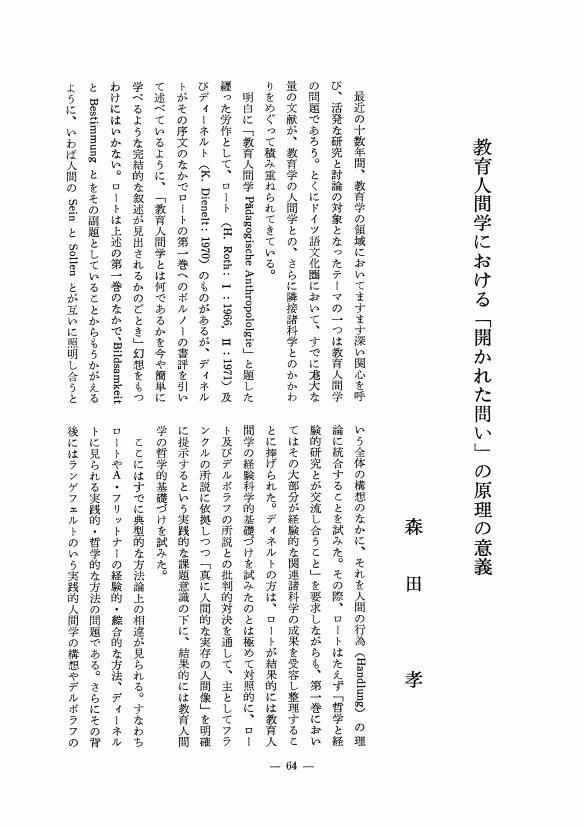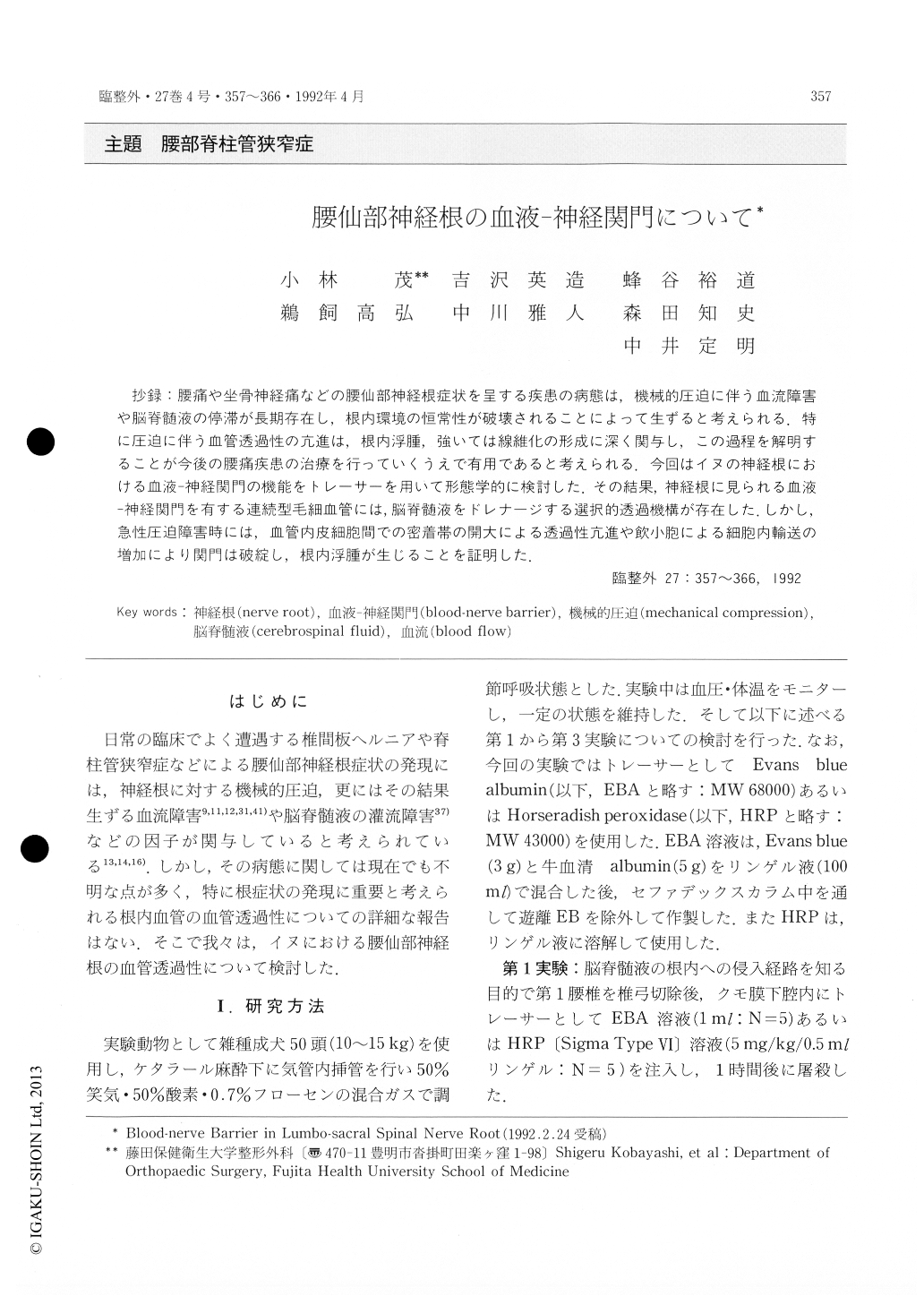1 0 0 0 OA 西ドイツの教育学界の現況 哲学および人間諸科学の研究動向と関連して
- 著者
- 森田 孝
- 出版者
- 教育哲学会
- 雑誌
- 教育哲学研究 (ISSN:03873153)
- 巻号頁・発行日
- vol.1977, no.35, pp.75-78, 1977-05-20 (Released:2009-09-04)
1 0 0 0 OA 教育人間学における「開かれた問い」の原理の意義
- 著者
- 森田 孝
- 出版者
- 教育哲学会
- 雑誌
- 教育哲学研究 (ISSN:03873153)
- 巻号頁・発行日
- vol.1972, no.25, pp.64-67, 1972-05-20 (Released:2009-09-04)
1 0 0 0 OA 教育における平等の原理とその問題
- 著者
- 森田 孝
- 出版者
- 教育哲学会
- 雑誌
- 教育哲学研究 (ISSN:03873153)
- 巻号頁・発行日
- vol.1967, no.16, pp.36-47, 1967-10-10 (Released:2009-09-04)
- 参考文献数
- 22
The statement, “All men are equal” is neither the expression of a simple, intuitive truth, nor an empirical generalisation, nor is it an emotional expression of the oppressed. As one possible approach to the complex area of equality in education, the author by means of an analysis of the concept of equality has first examined the problem of justification of the principle of equality expressed by the general imperative, “Equals are treated equally, unequals unequally”. Through the clarification of the logical characteristics of this general imperative, he has attempted to arrange properly the various points at issue brought up in the discussion of this complex problem area and to connect them with various other principles.Especially in regard to the practical side of the problem of the principle of equality arising when it appears in the form of the equality of educational opportunity, attention was paid to recent trends in the educational world of America and England; by way of conclusion it was demonstrated that the problem of equality in education as formation of man, must be studied in the broader context of all the various principles which make man a human being.
1 0 0 0 OA アインシュタインの光子箱再論
- 著者
- 森田 邦久
- 出版者
- 科学基礎論学会
- 雑誌
- 科学基礎論研究 (ISSN:00227668)
- 巻号頁・発行日
- vol.38, no.2, pp.49-54, 2011-05-15 (Released:2017-08-01)
- 参考文献数
- 10
In 1930, Einstein proposed the Gedankenexperiment that seems to show the invalidity of the time-energy uncertainty relation. Bohr gave an answer to this Einstein's challenge by resorting to the Einstein's general theory of relativity. However, many scientists and philosophers have critiqued his answer, and proposed new ones. The important proposals in these are ones given by Treder and Busch. In this paper, I survey and critique these answers. The point is how to interpret the time-energy uncertainty relation appeared in the Einstein's Photon Box. Next, I suggest a new answer to the Photon Box Gedankenexperment. My suggestion is that measurement of energy of phton is done by measuring the mass of box before and after the emission of photon.
1 0 0 0 OA 科学的説明と自然現象の本質
- 著者
- 森田 邦久
- 出版者
- 科学基礎論学会
- 雑誌
- 科学基礎論研究 (ISSN:00227668)
- 巻号頁・発行日
- vol.34, no.1, pp.29-37, 2007-03-25 (Released:2009-07-31)
- 参考文献数
- 23
- 被引用文献数
- 1 2
There are three received approaches to scientific explanation: causal, unification and pragmatics. However, I will try to highlight the insufficiency of these approaches in this paper, furthermore instead, suggest a new approach: explanation by showing the essence of the phenomena. 'The essence of the phenomena' is what distinguishes the class of phenomena in question from the other classes of phenomena. Therefore, unification surely plays an important role in the scientific explanation, but its role is to clarify the essence of the phenomena.
1 0 0 0 OA 農地改革と天然資源局 : 一九四五年一〇月~一九四六年一月
- 著者
- 森田 貴子
- 雑誌
- 学習院女子大学紀要 (ISSN:13447378)
- 巻号頁・発行日
- no.19, pp.79-86, 2017-03-01
1 0 0 0 OA 幻視と貝殻 カルパッチョ作 《聖アウグスティヌスの幻視》の再検討
- 著者
- 森田 優子
- 出版者
- 美学会
- 雑誌
- 美学 (ISSN:05200962)
- 巻号頁・発行日
- vol.69, no.2, pp.93, 2018 (Released:2020-03-23)
- 著者
- 森田 優子
- 出版者
- 美学会
- 雑誌
- 美学 (ISSN:05200962)
- 巻号頁・発行日
- vol.62, no.2, pp.132, 2011-12-31 (Released:2017-05-22)
- 著者
- 森田 亜紀
- 出版者
- 美学会
- 雑誌
- 美学 (ISSN:05200962)
- 巻号頁・発行日
- vol.59, no.2, pp.169, 2008-12-31 (Released:2017-05-22)
1 0 0 0 OA 聖アウグスティヌスの書斎 : カルパッチョ作「スラブ人会」連作をめぐって
- 著者
- 森田 優子
- 出版者
- 美学会
- 雑誌
- 美学 (ISSN:05200962)
- 巻号頁・発行日
- vol.59, no.2, pp.72-85, 2008-12-31 (Released:2017-05-22)
The cycle of Sts. George, Jerome and Tryphon for the Scuola Dalmata was executed by Vittore Carpaccio in ca. 1502-1511. The Vision of St. Augustine of the cycle is based on the apocryphal letters. Compared with the examples of same subject and the representations of the other study, it reveals that this work is different from the traditional iconography. The setting of study and chapel focused on both the contemplative life and the daily work of bishop. It finds also the details which demonstrate a kind of collectionism. These become the factors which remind anyone's portrait. When we concern on this problem, it's important to see it in the patronal context. The production of the cycle has been inspired by the donation of the relic by Paolo Vallaresso, and it's also important to remember that Maffeo Vallaresso is the archbishop of Zara. He is the humanist-ecclesiastic, interested with the art, which recorded in his letters. On considering these factors, the setting of study and art-conscious details, in the contemporary context, so it can say that the St. Augustine's study is intended to allude the intellectual and ecclesiastical figure of Maffeo Vallaresso.
- 著者
- 森田 優子
- 出版者
- 美学会
- 雑誌
- 美学 (ISSN:05200962)
- 巻号頁・発行日
- vol.59, no.1, pp.188, 2008-06-30 (Released:2017-05-22)
1 0 0 0 OA 歴史学は感情をどう扱うのか——罵りをめぐる感情史の一試論——
- 著者
- 森田 直子
- 出版者
- 日本感情心理学会
- 雑誌
- エモーション・スタディーズ (ISSN:21897425)
- 巻号頁・発行日
- vol.5, no.1, pp.45-55, 2020-03-31 (Released:2020-11-11)
This article deals with the question of how historical science can treat and/or analyze emotions. The importance of historical research written in the 1930s, which focused on the “relationship between mind and body,” is introduced at the outset. I then provide an overview of other academic disciplines such as neuroscience, psychology, and philosophy and see how they treat emotion, specifically “fear.” This first part clarifies what historical science can do in terms of analyzing emotions. In the next section, I discuss the history of emotions and curse words. Using dictionaries like Deutsches Schimpfwörterbuch oder die Schimpfwörter der Deutschen (1839) and the Brothers Grimm’s Deutsches Wörterbuch (1838–) as well as documents written by university students, I identify the curse words used in Germany in the 19th century. If these vulgarities were exchanged between students and/or young craftsmen, semi-fatal duels or brawls took place, which allows one to reconstruct the various emotions in the “emotional communities”. I conclude this paper by arguing that the moral values of the modern German society were reflected in the curse words of the time.
1 0 0 0 実践的な高等学校家庭科「染色」教材開発のための先行論文の検討
- 著者
- 駒津 順子 小松 恵美子 森田 みゆき
- 出版者
- 日本家庭科教育学会
- 雑誌
- 日本家庭科教育学会大会・例会・セミナー研究発表要旨集
- 巻号頁・発行日
- vol.51, pp.76, 2008
<B><目的></B> 高等学校家庭科で実施する「染色」教材の開発研究を行ってきた。高等学校家庭科において「染色」の辿ってきた歴史を知るために、高等学校学習指導要領・教科書等における「染色」取り扱い科目及び領域の変遷について調査したところ、家庭科における「染色」は、「更正染」「手芸染色」「生活文化の伝承」の順に変遷し位置づけられていることがわかった。今の時代を反映した「染色」教材を開発するための視点を検討した結果、高等学校家庭科における「染色」の授業は、「生活スキルの向上により生徒に自信を持たせ、自己理解を深めさせることができる」と考えられた。今回は、実践的な教材開発のために、「染色」教材や「染色」研究についての論文検索を行い、先行研究を抽出して内容を比較検討した。それらを元に教材化のための予備実験を行った。<BR> <B><方法></B> 論文検索は学会誌5誌と商業誌7誌を対象とした。学会誌は、繊維学会誌、日本家政学会誌、日本家庭科教育学会誌、日本蚕糸学会誌、化学と教育、であった。また商業誌は、染色研究、染料と薬品、染色工業、色材、月刊染織α、京染と精練染色、考古学と自然科学、であった。論文検索には、国立情報学研究所(NII)のポータルサイトであるCiNii(NII論文情報ナビゲータ)を使用した。論文は発表年が2005年までのものを対象とした。論文の抽出および分類は13のキーワード(染色法、色素の合成、分解、洗浄、環境、廃液、堅牢度、拡散、天然染料、染色教材、染色領域、顔料、その他)を設定し、論文タイトルから読み取り該当するものを抽出した。なお、「繊維学会誌」と「日本家政学会誌」の2誌に関しては、CiNii掲載以前の論文についても検索対象とした。<BR> <B><結果></B> 学会誌の検索論文総数は18,087件であり、染色教材に関するものは日本家庭科教育学会誌が1件、化学と教育が43件であった。一方、商業誌の検索論文総数は4,901件であり、染色教材に関するものは月刊染織αが8件であった。日本家庭科教育学会誌から抽出された論文は生野ら<SUP>(1)</SUP>によるものであった(以下論文1とする)。この他に、大学紀要等で発表されている論文2<SUP>(2)</SUP>、論文3<SUP>(3)</SUP>、論文4<SUP>(4)</SUP>を加えた4件の論文を検討対象とした。論文1は玉葱、紅茶、紅花、藍の染色条件を検討し堅牢性も調べた上で標本を作成しており、実践的な教材を検討するには最も参考になると考えられた。論文1の染色材料の中で手に入りやすいものは玉葱と紅茶であった。教材としては媒染剤による色相の変化が大きい方が望ましく、また被服だけでなく家庭科の様々な科目で実践が想定できることから、玉葱を染色材料に選び、論文1の実験条件をもとに予備実験を行った。実験はすべて水道水を使用して行った。のり無し白布を試料布として、同一染液で布を換えて2回染色を行い、色の濃さを比較した結果、目視では1回目染液染色布と2回目染液染色布の差は見られなかった。媒染剤は5種類を検討した。鉄明礬と硫酸第一鉄アンモニウムは暗緑色、カリウム明礬は山吹色、塩化カリウムとリン酸水素二カリウム、及び未媒染は薄茶色となった。<BR> <B><引用文献></B>(1)染色教材への天然植物染料の適用-主として玉葱・紅茶の場合-、生野晴美、堀内かおる、岩崎芳枝、日本家庭科教育学会誌、34、31-36(1990)、(2)地域素材を用いた染色教材の開発-さくらの葉を用いた場合-、日景弥生、三國咲子、弘前大学教育学部紀要、80、71-78(1998)、(3)小学校家庭科と関連させた「総合的な学習の時間」の構築-草木染めの教材化-、後藤景子、橘高純子、京都教育大学紀要、107、115-122(2005)、(4)天然藍の染色教材への適用、浦野栄子、萩原應至、信州大学教育学部附属教育実践研究指導センター紀要、7、181-188(1999)
1 0 0 0 OA ドイツ近代の名誉市民権 : その起源と意義
- 著者
- 森田 直子
- 出版者
- 公益財団法人 史学会
- 雑誌
- 史学雑誌 (ISSN:00182478)
- 巻号頁・発行日
- vol.120, no.11, pp.1833-1856, 2011-11-20 (Released:2017-12-01)
The honorary citizenship (Ehrenburgerrecht) bestowed by the German towns has been considered to be comparable with such honours as the orders, titles and prizes conferred by the state or the monarch from the mid-nineteenth century on. Also, the research done on a Prussian metropolis during the German empire tells us that honorary citizenship was highly reputed and played a significant role in the political culture of the city. But when did this custom first appear? And why did honorary citizenship(=civic right) possess such value? In an attempt to answer these questions, this article examines 1) the concept of honorary citizen or citizenship, 2) several historical cases in which towns provided certain people with civic right (Burgerrecht) out of gratitude or affection without obligation, 3) "le titre de citoyen francais" bestowed by revolutionary France on foreigners with great accomplishments, and 4) the codification of honorary citizenship in modern municipal laws beginning with the Prussian "Stein's municipal law" of 1808. The author concludes that the concept of honorary citizen (ship) has been characterised by the ideas of the German medieval township and its civic right, and that the regulations pertaining to honorary citizenship in the municipal laws were also interrelated with the recognition of traditional citizenship. As to the origin of modern honorary citizenship, it was based on the image of an idealised medieval version, established under the influence of the French Revolution and then institutionalised in municipal laws during the nineteenth century. Furthermore, the high reputation attributed to honorary citizenship was rooted in the traditional value of the kind of idealized medieval township reflected in civic right.
- 著者
- 森田 直子
- 出版者
- 公益財団法人 史学会
- 雑誌
- 史学雑誌 (ISSN:00182478)
- 巻号頁・発行日
- vol.119, no.1, pp.120, 2010-01-20 (Released:2017-12-01)
- 著者
- 森田 安一
- 出版者
- 公益財団法人 史学会
- 雑誌
- 史学雑誌 (ISSN:00182478)
- 巻号頁・発行日
- vol.108, no.1, pp.102-109, 1999-01-20 (Released:2017-11-30)
1 0 0 0 イヤーワームに導かれた予定の無意図的想起
- 著者
- 森田 泰介
- 出版者
- 東京理科大学教養科
- 雑誌
- 東京理科大学紀要. 教養篇 (ISSN:02867915)
- 巻号頁・発行日
- no.48, pp.81-92, 2016
1 0 0 0 腰仙部神経根の血液―神経関門について
抄録:腰痛や坐骨神経痛などの腰仙部神経根症状を呈する疾患の病態は,機械的圧迫に伴う血流障害や脳脊髄液の停滞が長期存在し,根内環境の恒常性が破壊されることによって生ずると考えられる.特に圧迫に伴う血管透過性の亢進は,根内浮腫,強いては線維化の形成に深く関与し,この過程を解明することが今後の腰痛疾患の治療を行っていくうえで有用であると考えられる.今回はイヌの神経根における血液―神経関門の機能をトレーサーを用いて形態学的に検討した.その結果,神経根に見られる血液―神経関門を有する連続型毛細血管には,脳脊髄液をドレナージする選択的透過機構が存在した.しかし,急性圧迫障害時には,血管内皮細胞間での密着帯の開大による透過性亢進や飲小胞による細胞内輸送の増加により関門は破綻し,根内浮腫が生じることを証明した.
1 0 0 0 OA 季節を祝う食べ物 : (1) 新年を祝う七種粥と小豆粥
- 著者
- 森田 潤司 MORITA Junji
- 出版者
- 京都
- 雑誌
- 同志社女子大学生活科学 = DWCLA human life and science (ISSN:13451391)
- 巻号頁・発行日
- vol.44, pp.79-83, 2011-02-20
1 0 0 0 OA 明治期の千葉県嶺岡牧における畜産業と入会慣行
- 著者
- 森田 貴子
- 雑誌
- 学習院女子大学紀要 (ISSN:13447378)
- 巻号頁・発行日
- no.17, pp.35-49, 2015-03-01








